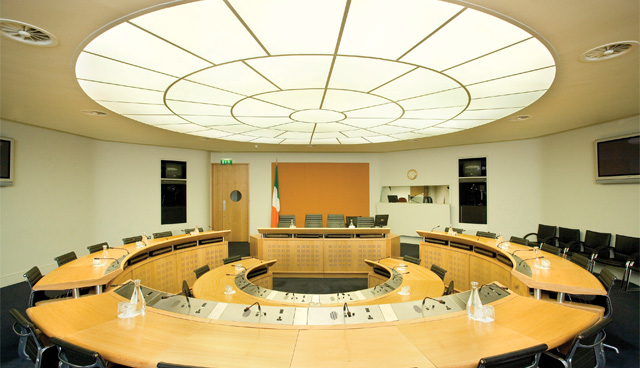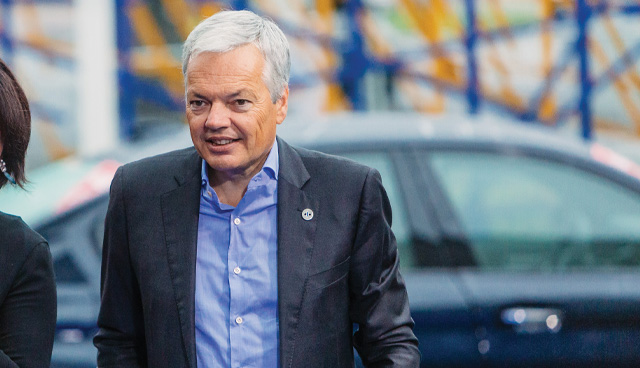Irish defamation law ‘a constraint on media freedom’

Ireland’s defamation laws “raise concerns as regards the ability of the press to expose corruption”, the European Commissioner for Justice has stated.
Justice Commissioner Didier Reynders addressed the Oireachtas Joint Committee on European Union Affairs in March and underlined concerns in the EU around the frequent use and high costs of defamation cases in Ireland.
Reynders was in Ireland to discuss the EU Commission’s Rule of Law report, which produced specific country chapters for each member state. It includes analysis on the topics of judicial independence, media plurality and anti-corruption measures.
Published in September 2020, the first annual report on the Rule of Law across the European Union is intended to kickstart an inclusive debate on rule of law culture across the EU.
Ireland’s defamation laws are amongst the strictest in Europe and there has long been calls for reform of the laws by those who believe that the bar for lawsuits is set too low. Around 80 per cent of all defamation actions in Ireland are brought against the media.
Damages in a defamation case can be extremely expensive and the prospect of such costs, in addition to legal costs, means that the majority of libel cases have traditionally been settled before coming to court.
When the Defamation Act 2009 first came into force, it was envisaged that the Minister for Justice would complete a review of its operation within one year, however, despite repeated efforts over the last decade to progress a review, none have been completed.
Responding to a comment by Senator Michael McDowell, who when Minister for Justice in the early 2000s initiated reforms of the defamation law, that Irish defamation law is “a little bit suffocating of investigative journalism”, Reynders added: “The report indicates that frequent defamation legal cases, the high cost of defence and the high damages awarded by the Irish courts are seen as an inducement to self-censorship and a constraint on media freedom.”
The Commissioner says that this “works to the detriment of the fight against corruption”.
Ireland’s Programme for Government has set out an ambition for the Government to review and reform defamation laws, aiming to “ensure a balanced approach to the right to freedom of expression, the right to protection of good name and reputation, and the right of access to justice”.
Noting that the Government has pledged to reform defamation laws, Reynders said that ensuring a balance between freedom of expressions, the right to the protection of reputation, and the right of access to justice, is very important.
In February 2021, Minister for Justice Helen McEntee TD, published the Government’s Justice Plan 2021, which included amongst 200 actions to be implemented in the next 12 months, a pledge to review and reform defamation laws.
The plan set out intentions to complete and publish a statutory review of the Defamation Act 2009 by quarter one of 2021 and to prepare a Scheme of Defamation (Amendment) Bill by quarter four.
Rule of Law
Reynders opened his address to the Oireachtas Joint Committee on European Union Affairs by expressing his gratitude to the legislature and authorities in Ireland for their “strong commitment to upholding the rule of law”.
Setting out the basis for the Rule of Law Report, the Commissioner said: “Respect for the rule of law is key in the Union. Yet, we have seen these years it cannot always be taken for granted.”
On the independence, quality, and efficiency of the justice system in Ireland, the Commissioner welcomed the establishment of an independent Judicial Council at the end of 2019 and pointed to a general perception that the independence of courts and judges “has been consistently high over the last years” in Ireland.
However, the Commissioner pointed to concerns around the controversial Judicial Appointments Commission Bill 2017, which included the creation of a judicial appointments commission chaired by someone who was not a judge amongst other reforms.

While the Bill was prevented from passing into law before the end of the last government mandate, in December 2020 the Minister for Justice announced that she had secured government approval for the drafting of a Judicial Appointments Commission Bill. The Bill provides for the establishment of a new commission to replace the Judicial Appointments Advisory Board.
Commenting on concerns raised in regard to the previous bill relating to the composition of the judicial appointment commission, Reynders said: “A decrease in the number of candidates to be submitted to the Government for consideration, as well as the application of the procedure to all judicial appointments could limit political discretion.” The Commissioner underlined the importance of reforms to take account of the Council of Europe recommendations and said that the EU Commission was following the creation of a new Bill in Ireland closely.
Reynders pointed to the potential for accountability of judges to be improved through the establishment of the body in charge of disciplinary proceedings against judges but added that as the Dáil remains in charge of deciding the removal from office of judges, this could “raise concerns about the politicisation of the process”.
Finally, he stated that the Commission is aware that work is still ongoing on establishing a compensation scheme to award damages in the event of protracted court proceedings, as required by a European Court of Human Rights judgement.
Anti-corruption
On the anti-corruption framework, the Commissioner acknowledged the reforms that have been carried out in Ireland, in particular through the Criminal Justice Act 2018, aiming to strengthen the fight against corruption. However, while he recognised the positive development of the Act including several offences relating to corruption, he added that the dual criminality provision “may limit the scope for prosecuting foreign bribery”.
As outlined above, Reynder, under the pillar of media pluralism, set out his belief that the frequent use and high costs of defamation cases raise concerns. However, the Commissioner highlighted “constitutional guarantees and solid regulatory structures” in Ireland around media pluralism.
“These operate within a political culture that avoids intervention in editorial content of media outlets and prevents conflicts of interests in terms of media ownership,” he stated, adding that steps by the media regulator to update and publish information on media ownership on an annual basis is to be welcomed.
Checks and balance
On the last pillar of the report, the Commissioner said that Ireland has an established practice of consultation on draft legislation by the Government and Parliament, and of impact assessments.
“The scrutiny over Private Members’ Bills that pass a certain stage of the legislative process is similarly developed,” he said, adding that the Commission’s understanding that the Human Rights and Equality Commission is “well equipped” to carry out its functions.
However, he said that some concerns had been raised in relation to restrictions on funding possibilities for civil society organisations. Stating the Commission’s understanding that the space for civil society organisations is generally considered open in Ireland, Reynders pointed to some concerns that the current interpretation of the Electoral Act is a constraint on civil society actions.
The Commission is working on the second edition of the report, which is set to be adopted in July of this year.





